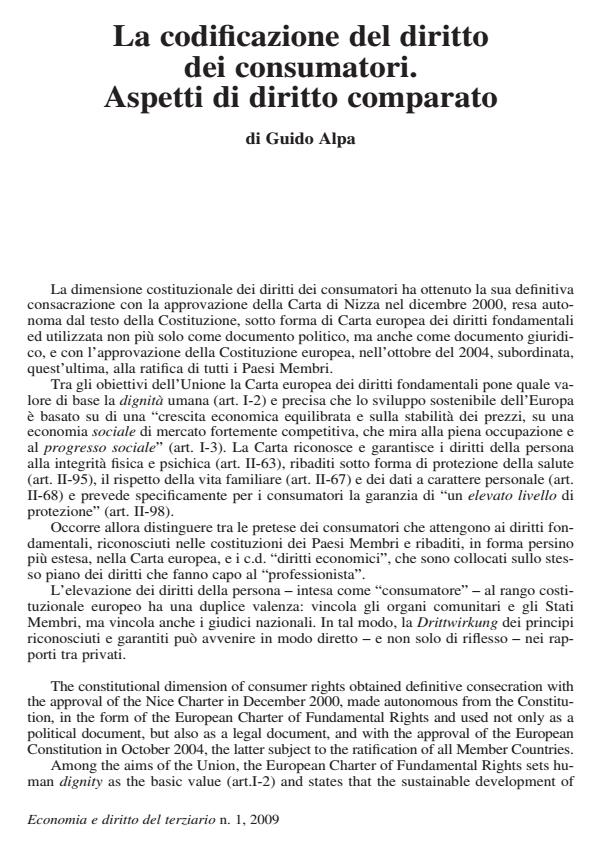La codificazione del diritto dei consumatori. Aspetti di diritto comparato
Titolo Rivista ECONOMIA E DIRITTO DEL TERZIARIO
Autori/Curatori Guido Alpa
Anno di pubblicazione 2009 Fascicolo 2009/1
Lingua Italiano Numero pagine 15 P. 69-83 Dimensione file 575 KB
DOI 10.3280/ED2009-001003
Il DOI è il codice a barre della proprietà intellettuale: per saperne di più
clicca qui
Qui sotto puoi vedere in anteprima la prima pagina di questo articolo.
Se questo articolo ti interessa, lo puoi acquistare (e scaricare in formato pdf) seguendo le facili indicazioni per acquistare il download credit. Acquista Download Credits per scaricare questo Articolo in formato PDF

FrancoAngeli è membro della Publishers International Linking Association, Inc (PILA)associazione indipendente e non profit per facilitare (attraverso i servizi tecnologici implementati da CrossRef.org) l’accesso degli studiosi ai contenuti digitali nelle pubblicazioni professionali e scientifiche
La codificazione del diritto dei consumatori. Aspetti di diritto comparato - The constitutional dimension of consumer rights obtained definitive consecration with the approval of the Nice Charter in December 2000, made autonomous from the Constitution, in the form of the European Charter of Fundamental Rights and used not only as a political document, but also as a legal document, and with the approval of the European Constitution in October 2004, the latter subject to the ratification of all Member Countries. Among the aims of the Union, the European Charter of Fundamental Rights sets human dignity as the basic value (art.I-2) and states that the sustainable development of Europe is based on "balanced economic growth and price stability, a highly competitive social market economy, aiming at full employment and social progress"(art.I-3). The Charter recognizes and guarantees the right of individuals to physical and mental integrity (art.II-63), reaffirmed in the form of health protection (art.II-95), respect for family life (art.II-67) and protection of personal data (art.II-68) and specifically provides "a high level of protection" for consumers (art.II-98). Consequentially, a distinction should be made between consumer claims which adhere to fundamental rights, recognized in the constitutions of the member countries, and emphasised in the European Charter, and the so-called "economic rights", which are placed on the same level of those rights referring to the "professional". The elevation of individual rights - as a "consumer" - to European constitutional level has a dual value: it binds the Community institutions and the Member States, but it also binds national courts. In this way, the Drittwirkung of the recognized and guaranteed principles may take place directly - and not only as a consequence - in the relations between individuals.
Guido Alpa, La codificazione del diritto dei consumatori. Aspetti di diritto comparato in "ECONOMIA E DIRITTO DEL TERZIARIO " 1/2009, pp 69-83, DOI: 10.3280/ED2009-001003